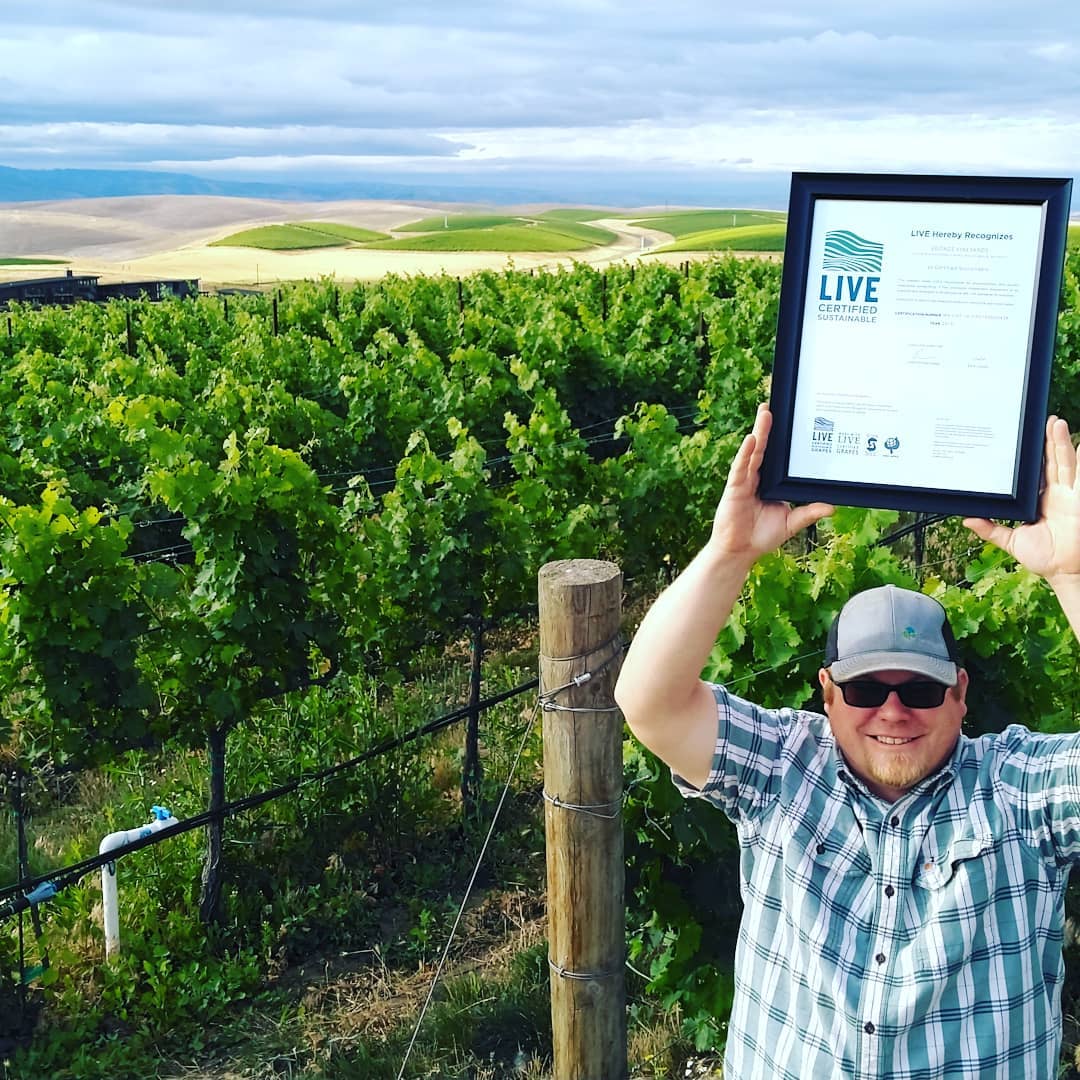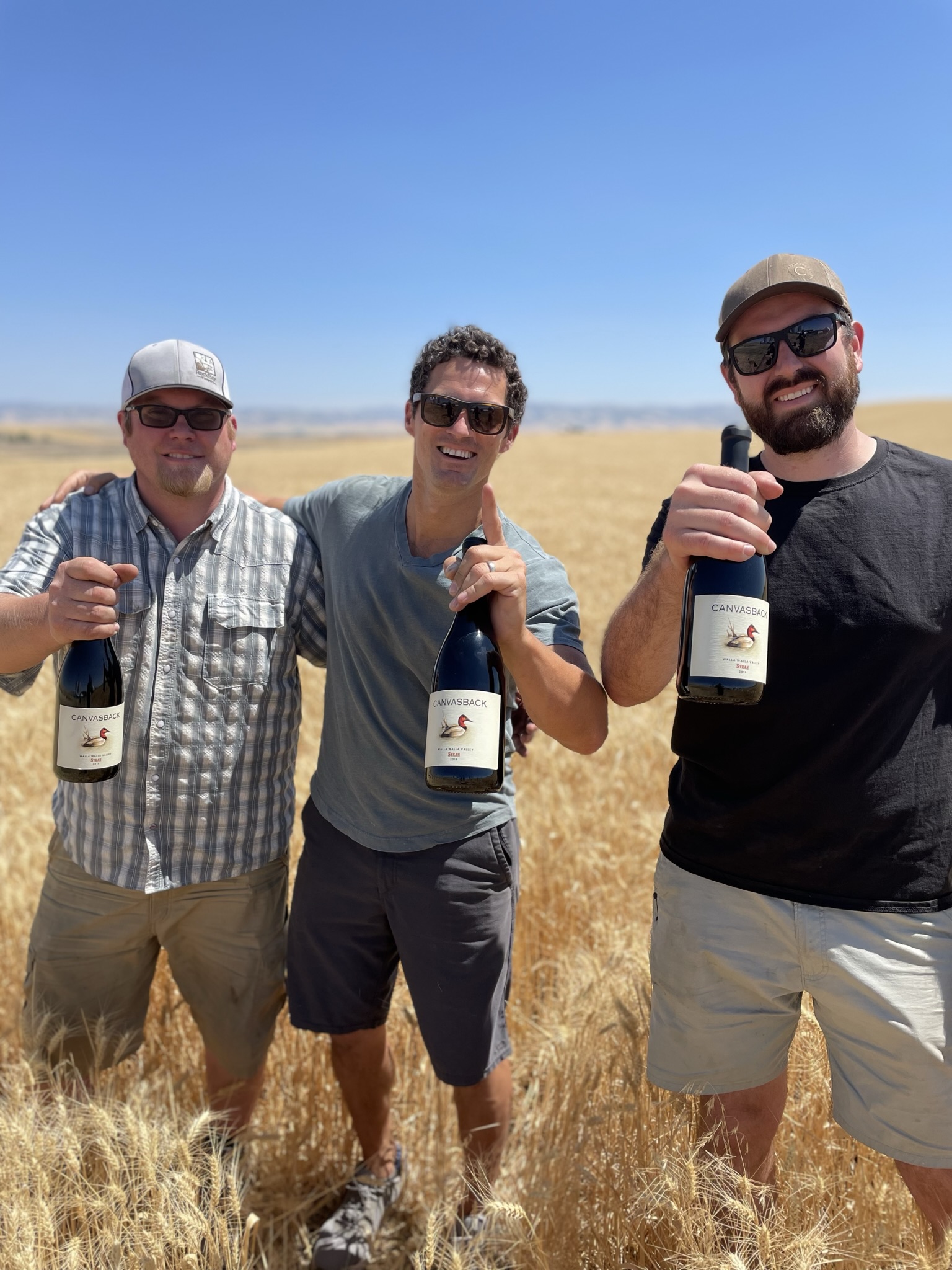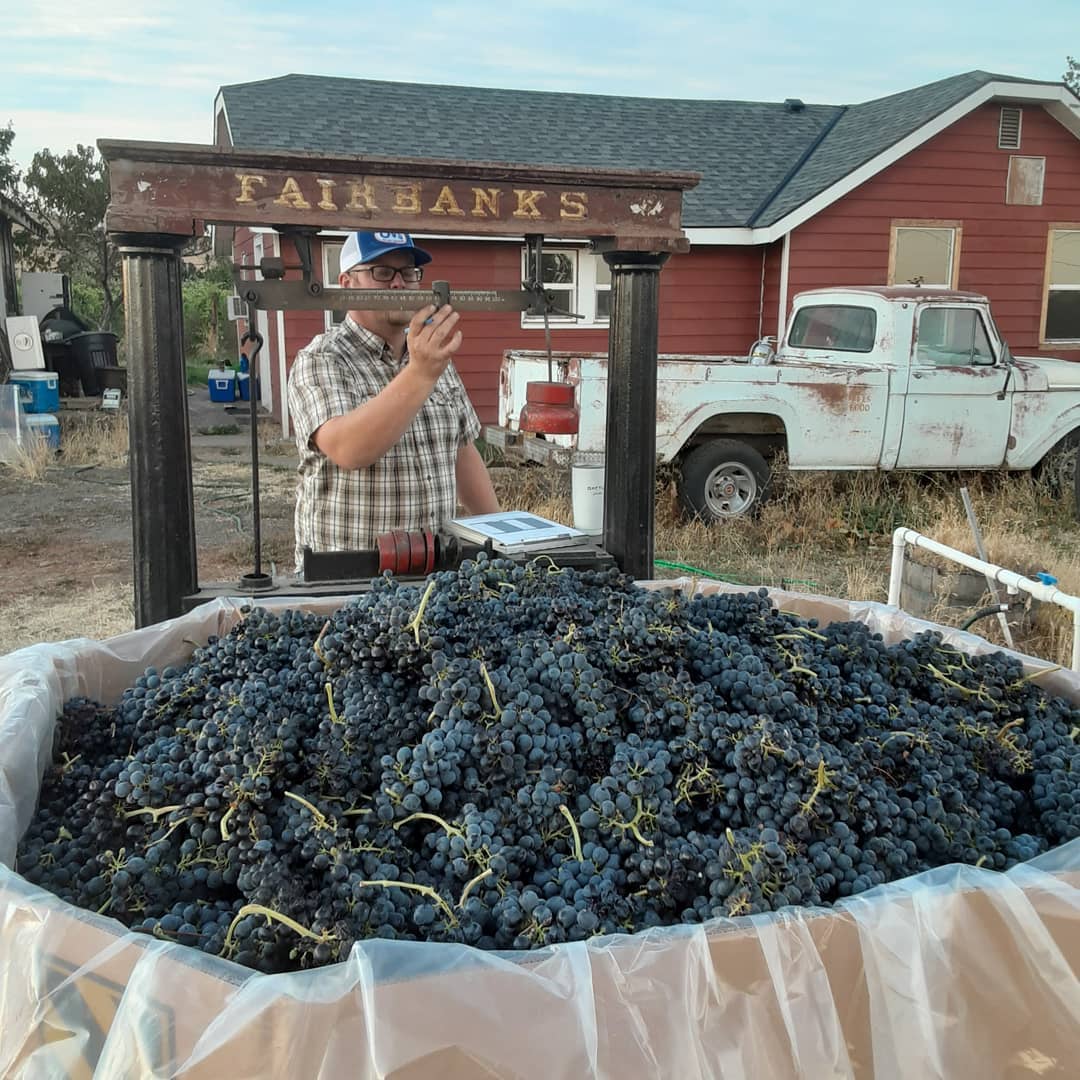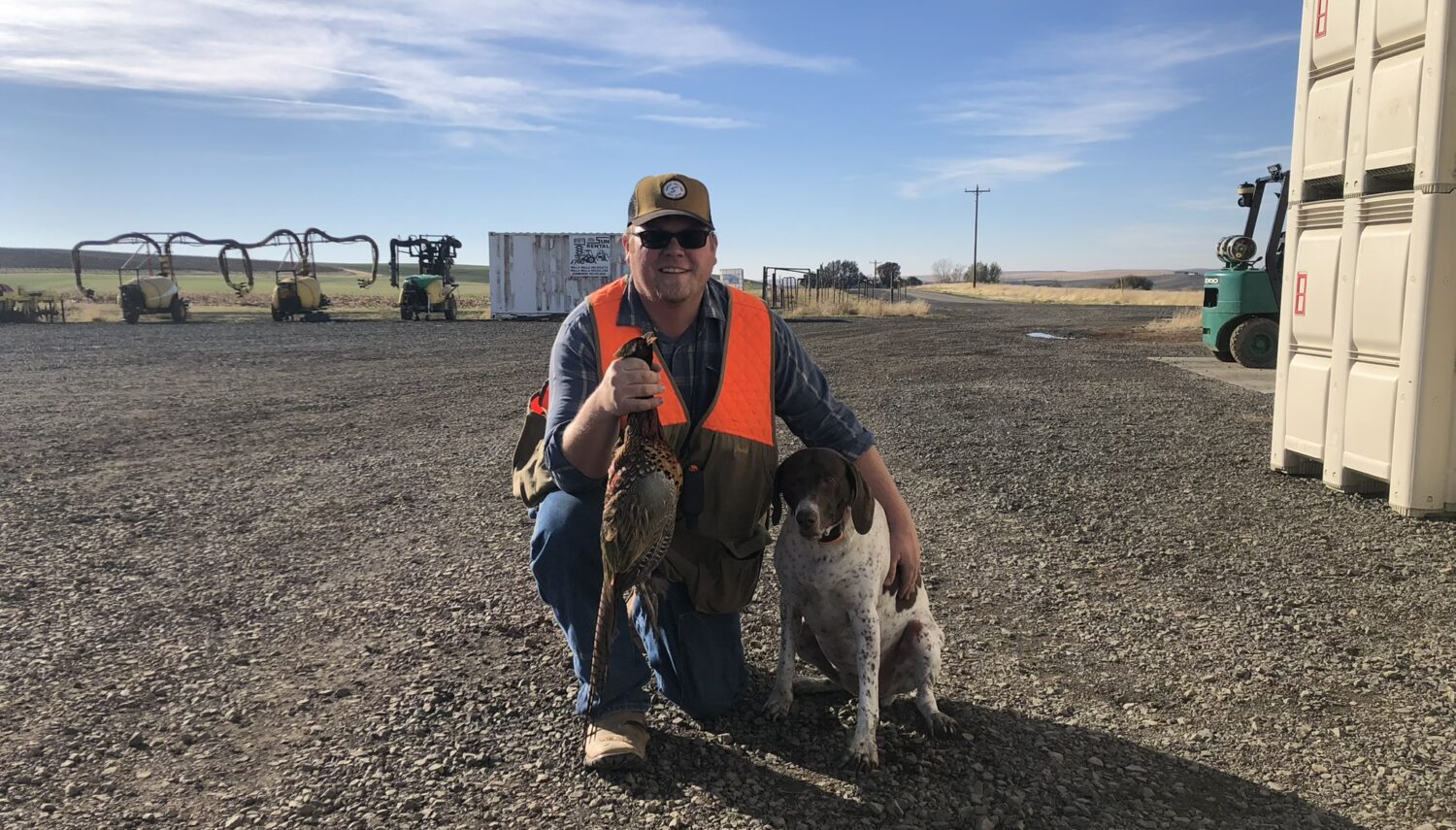Dana Lammers is a 2014 graduate of the WWCC EV program. He was the Vineyard Manager at Eritage Vineyards for nine years before recently moving to Knights Grapevine Nursery where he supports growers all over Washington and parts of eastern Oregon in their quest to grow the best grapes. He also farms his own vineyard, RockBar, in the Rocks District.

Steve Greentree: Can you please update me on some basic information, including your date of graduation from the EV program, current employer and position, social media handles, and preferred contact details?
Dana Lammers: I graduated in 2014 and managed Eritage Vineyards from just before I graduated until recently when I took the Washington Sales Rep position for Knights Grapevine Nursery, a nursery out of Olivehusrt, California. My email address is dana@knightsgrapevinenursery.com
SG: How did you get into wine?
DL: When I was a kid living in Montana, we had a few Concord vines that my dad planted on the south edge of the house when I was a baby. Those vines were the only ones that could survive in the cold Montana winters. My mom made jam with most of the grapes but my dad did try to make wine a few times but always struggled—it usually turned out like vinegar. I do recall one year he actually made really good wine, but then he wanted it a little sweeter so we added sugar and bottled it and soon after we left for a vacation to Disney World. When we came home from Disney, all the bottles had exploded, so not a great experience.
I went to college at Gonzaga and met a lot of people from California there–I even spent a summer down in the Napa Valley where I was introduced to their wines. I received an academic scholarship from Va Piano Winery while at Gonzaga, so I got a chance to do wine tastings when they came up to the college which introduced me to Washington wine. I got into home brewing with a few of my friends and near the end of college, we rented a house on the south side of Spokane which had these huge 40-year-old unknown variety grape vines in the backyard, so I thought if I can make beer, I should try making wine, and you know, it was pretty good.
After college, I went back to Montana and worked at my family’s ranch for a few years and when the family decided to sell it, I knew it was time for a new career. I was thinking of studying to become a lawyer or get into the wine industry. My dad said to me, “I don’t think you really want to be a lawyer–you need to look at making your vacation your vocation.” In the end, I decided to come to the EV program at WWCC and try my hand in the wine industry.
SG: Is there someone in the EV world that you admire, including fellow EV alums?
DL: You know, one person I definitely admire for what they’ve built is Jason Fox from Lagana Cellars. He was in the class ahead of me in the EV program, and after finishing school, he’s been able to diversify into several aspects of the industry—owning and making wine for Lagana, helping other people make wine—doing custom crush—as well as compliance consulting. He is the real deal.
SG: What’s special to you about working in the wine industry?
DL: I think that, particularly in the Walla Walla Valley, the wine industry is such a community in which all of us try to help each other. I have seen so many examples of this I am glad to be a part of this community.

SG: What is your favorite part of your job?
In my new job as a nursery rep, I really like meeting with growers in different areas and hearing about the interesting projects that they’re currently doing or ones they are thinking about. I also love being at the ground floor to help them build the vineyard project that they envision.
SG: What are some of the challenges you’ve faced in the industry?
DL: As you know, I’ve only been in the new job for about six weeks so don’t have the challenges in this segment down yet, but as a vineyard manager, the biggest challenge was the ups and downs of the grape-growing business. I believe it is more difficult to just be in the grape growing business—without making your own wine—and remain a consistent viable business.
We’ve had periods when there is a glut of grapes where it is particularly difficult to sell all your grapes. Other times mother nature makes it difficult with weather—freezes, hail, and other conditions can cause you to have a diminished crop or lose it altogether. Its farming, so there is risk.
SG: What do you think differentiates and excites you about Washington wine?
DL: I think one thing that really differentiates Washington wine is the diurnal shifts that we get throughout the growing season—it really helps to create wines with high quality aromas and flavors.
As we go forward and climate change really starts to raise the temperature in more established regions in places like California, I see more producers moving to places like the Walla Walla Valley and other proven growing regions in Washington. And what excites me is how the industry here is growing now—we have seen increased investment in the valley, we have all sorts of new projects and new directions in which the wine industry is going here in the valley and around the state.
Another thing that excites me is thinking about how wines will change—ten years from now, is Cab still going be the dominant grape from Washington? I think that’s most likely, but who knows. But what other new varietals will we start growing, and what other new wineries will be built or established brands open wineries here?
SG: How do you foresee climate change or social issues affecting the local industry in the next few years?
The weather, as mentioned a moment ago, will drive change. I also think that if the fires we’ve seen down in California and Oregon over the past few years continue, it will continue to push more people from the industry there, up here to Washington. We’ve also seen a lot of that investment in last year or two, with concerns like the Jackson family buying vineyards and ground here, and what they’re doing—expanding their portfolio into Washington—to me, is a signal of things to come—more investment from other established brands.
As for social drivers, COVID changed the world. Many people decided to move from big cities because what was happening where they lived or they found they could do their jobs remotely and enjoy a little space and to get out of the rat race. That has been a big draw here to the valley–we have a pretty good pace of life with some perks like wine and good restaurants and you can get anywhere in Walla Walla in like 8 minutes. The climate is also pretty good—four seasons—but usually a fairly mild winter. So, you know, I think that really draws people here, and that’s part of why the area will continue to grow and drive the local wine industry.
SG: What are some up-and-coming trends in wine that you’re following?
DL: One interesting trend that we talked about when I was at the Unified Wine & Grape Symposium in California a few weeks ago, is that of diversification into other Vitis Vinifera varietals. For a long time, the industry here in the Walla Walla Valley was pretty solidly just Bordeaux varietals—Cabernet, Merlot, Chardonnay and a few others. And then you get the Rhone varietals, like Syrah, made down in the Rocks District, and then in Willamette, you by and large just have Pinot Noir and other Burgundian varietals. I remember I was talking to some vineyard guys about this in 2013, when I was going to school, and I asked if they knew of anybody growing Pinot Noir in Walla Walla. And they said there is Breezy Slope with a little bit of Pinot–but that guy’s a fool–we need to stay within our lane and grow Bordeaux. Now at this point, ten years later, that’s completely gone away. Vineyards in the valley are growing Pinot and many other major varietals from around the world and a number of more obscure varietals are being planted, and it’s starting to branch out more—and that excites me.
SG: What advice can you share with future EV graduates?
DL: The best advice I can give is this: follow your heart–go do what makes you happy. If you are going to start your own winery—if that is what’s in your heart—that’s what you should do. You may have to go work for someone else for a while to make that happen, but always keep that dream and work on it to make it a reality. If you like the vineyard, learn from the best and buy land as you can and plant when you can and make it your reality. If there is another aspect of the industry you like—maybe you don’t want to start your own business but there is a niche for you, do it. Following your heart is kind of like my dad’s motto: make your vacation your vocation. Do the thing that makes work not WORK but gives you joy. That way you’re never going to work another day in your life, because essentially, you’re on vacation every day doing something you love.



Join the Conversation